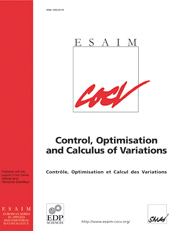Crossref Citations
This article has been cited by the following publications. This list is generated based on data provided by
Crossref.
Akagi, Goro
and
Stefanelli, Ulisse
2010.
A variational principle for doubly nonlinear evolution.
Applied Mathematics Letters,
Vol. 23,
Issue. 9,
p.
1120.
Spadaro, Emanuele
and
Stefanelli, Ulisse
2011.
A variational view at the time-dependent minimal surface equation.
Journal of Evolution Equations,
Vol. 11,
Issue. 4,
p.
793.
Rossi, Riccarda
Savaré, Giuseppe
Segatti, Antonio
and
Stefanelli, Ulisse
2011.
A variational principle for gradient flows in metric spaces.
Comptes Rendus Mathematique,
Vol. 349,
Issue. 23-24,
p.
1225.
STEFANELLI, ULISSE
2011.
THE DE GIORGI CONJECTURE ON ELLIPTIC REGULARIZATION.
Mathematical Models and Methods in Applied Sciences,
Vol. 21,
Issue. 06,
p.
1377.
Akagi, Goro
and
Stefanelli, Ulisse
2011.
Weighted energy-dissipation functionals for doubly nonlinear evolution.
Journal of Functional Analysis,
Vol. 260,
Issue. 9,
p.
2541.
Arnrich, Steffen
Mielke, Alexander
Peletier, Mark A.
Savaré, Giuseppe
and
Veneroni, Marco
2012.
Passing to the limit in a Wasserstein gradient flow: from diffusion to reaction.
Calculus of Variations and Partial Differential Equations,
Vol. 44,
Issue. 3-4,
p.
419.
Liero, Matthias
and
Stefanelli, Ulisse
2013.
A New Minimum Principle for Lagrangian Mechanics.
Journal of Nonlinear Science,
Vol. 23,
Issue. 2,
p.
179.
Bögelein, Verena
Duzaar, Frank
and
Marcellini, Paolo
2014.
Existence of evolutionary variational solutions via the calculus of variations.
Journal of Differential Equations,
Vol. 256,
Issue. 12,
p.
3912.
Akagi, Goro
and
Stefanelli, Ulisse
2014.
Doubly Nonlinear Equations as Convex Minimization.
SIAM Journal on Mathematical Analysis,
Vol. 46,
Issue. 3,
p.
1922.
Disser, Karoline
and
Liero, Matthias
2015.
On gradient structures for Markov chains and the passage to Wasserstein gradient flows.
Networks and Heterogeneous Media,
Vol. 10,
Issue. 2,
p.
233.
Mielke, Alexander
2015.
Analysis and Computation of Microstructure in Finite Plasticity.
Vol. 78,
Issue. ,
p.
125.
Melchionna, Stefano
2017.
A variational approach to symmetry, monotonicity, and comparison for doubly-nonlinear equations.
Journal of Mathematical Analysis and Applications,
Vol. 456,
Issue. 2,
p.
1303.
Duzaar, Frank
Marcellini, Paolo
Signoriello, Stefano
and
Bögelein, Verena
2017.
Parabolic equations and the bounded slope condition.
Annales de l'Institut Henri Poincaré C, Analyse non linéaire,
Vol. 34,
Issue. 2,
p.
355.
Melchionna, Stefano
2017.
A variational principle for nonpotential perturbations of gradient flows of nonconvex energies.
Journal of Differential Equations,
Vol. 262,
Issue. 6,
p.
3737.
Ortiz, Michael
Schmidt, Bernd
and
Stefanelli, Ulisse
2018.
A variational approach to Navier–Stokes.
Nonlinearity,
Vol. 31,
Issue. 12,
p.
5664.
Bögelein, Verena
Duzaar, Frank
Marcellini, Paolo
and
Scheven, Christoph
2018.
Doubly Nonlinear Equations of Porous Medium Type.
Archive for Rational Mechanics and Analysis,
Vol. 229,
Issue. 2,
p.
503.
Akagi, Goro
Melchionna, Stefano
and
Stefanelli, Ulisse
2018.
Weighted Energy-Dissipation approach to doubly nonlinear problems on the half line.
Journal of Evolution Equations,
Vol. 18,
Issue. 1,
p.
49.
Rossi, Riccarda
Savaré, Giuseppe
Segatti, Antonio
and
Stefanelli, Ulisse
2019.
Weighted Energy-Dissipation principle for gradient flows in metric spaces.
Journal de Mathématiques Pures et Appliquées,
Vol. 127,
Issue. ,
p.
1.
Davoli, Elisa
and
Stefanelli, Ulisse
2019.
Dynamic Perfect Plasticity as Convex Minimization.
SIAM Journal on Mathematical Analysis,
Vol. 51,
Issue. 2,
p.
672.
Bögelein, Verena
Dacorogna, Bernard
Duzaar, Frank
Marcellini, Paolo
and
Scheven, Christoph
2020.
Integral Convexity and Parabolic Systems.
SIAM Journal on Mathematical Analysis,
Vol. 52,
Issue. 2,
p.
1489.


